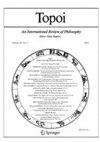做一个直接的现实主义者——塞尔、麦克道尔和特拉维斯谈“看事物的本来面目”
IF 1.3
2区 哲学
0 PHILOSOPHY
引用次数: 0
摘要
本文的目的是识别和分析当前感知现实主义支持者之间的三个特定争议,这些争议可能会揭示直接现实主义历史和当前讨论中存在的紧张局势。从John Searle的直接现实主义概念出发,我首先将McDowell和Travis的方法与之进行对比。然后,我进一步比较了特拉维斯和麦克道尔的观点。我认为这三位哲学家之间的差异首先可以追溯到感性经验方法的方法论概念(哲学自然主义是否意味着要处理亚个人层面),然后是什么导致了感性经验的特殊性(它是否涉及意识和统一任务),最后,是什么造就了世界上事物经验的决定性(这种决定性是世界本身的特征,还是包含了语言和思想)本文章由计算机程序翻译,如有差异,请以英文原文为准。
Being a Direct Realist – Searle, McDowell, and Travis on ‘seeing things as they are’
Abstract The aim of the present article is to identify and analyze three particular disputes among current proponents of perceptual realism which may throw light on tensions present in the history of direct realism and current discussions. Starting from John Searle’s conception of direct realism, I first set McDowell and Travis’s approaches in contrast with it. I then further compare Travis’ view with McDowell’s. I claim that differences among the three philosophers are traceable first to methodological conceptions of the approach to perceptual experience (whether philosophical naturalism implies dealing with the sub-personal level), then to what makes for the particularity of a perceptual experience (whether it involves consciousness and a task of unity or not), and finally to what makes for the determinacy of an experience of things in the world (whether such determinacy characterizes the world itself or, as such, involves language and thought).
求助全文
通过发布文献求助,成功后即可免费获取论文全文。
去求助
来源期刊

TOPOI-AN INTERNATIONAL REVIEW OF PHILOSOPHY
PHILOSOPHY-
CiteScore
3.10
自引率
7.10%
发文量
47
期刊介绍:
Topoi''s main assumption is that philosophy is a lively, provocative, delightful activity, which constantly challenges our received views, relentlessly questions our inherited habits, painstakingly elaborates on how things could be different, in other stories, in counterfactual situations, in alternative possible worlds. Whatever its ideology, whether with the intent of uncovering a truer structure of reality or of soothing our anxiety, of exposing myths or of following them through, the outcome of philosophical activity is always the destabilizing, unsettling generation of doubts, of objections, of criticisms. It follows that this activity is intrinsically a ''dialogue'', that philosophy is first and foremost philosophical discussion, that it requires bringing out conflicting points of view, paying careful, sympathetic attention to their structure, and using this dialectic to articulate one''s approach, to make it richer, more thoughtful, more open to variation and play. And it follows that the spirit which one brings to this activity must be one of tolerance, of always suspecting one''s own blindness and consequently looking with unbiased eye in every corner, without fearing to pass a (fallible) judgment on what is there but also without failing to show interest and respect. Topoi''s structure is a direct expression of this view. To maximize discussion, we devote most or all of this issue to a single topic. And, since discussion is only interesting when it is conducted seriously and responsibly, we usually request the collaboration of a guest-editor, an expert who will identify contributors and interact with them in a constructive way. Because we do not feel tied to any definite philosophical theme (or set of them), we choose the topic with absolute freedom, looking for what is blossoming and thriving, occasionally betting on what might - partly through our attention - ''begin'' to blossom and thrive. And because we do not want our structur e to become our own straightjacket, we are open to contributions not fitting the ''topos'', and do not rule out in principle the possibility of topic-less issues.
 求助内容:
求助内容: 应助结果提醒方式:
应助结果提醒方式:


